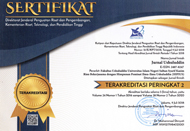Sufi Healing Methods For Preventing Anxiety On Patient With Coronary Heart Disease: A Case Study Of Rumah Therapy Haurgeulis, Indramayu, West Java
Abstract
Keywords
Full Text:
PDFReferences
Budihalim S, Sukatman D. Psikosomatis Dalam Ilmu Penyakit Dalam. Jakarta: FKUI, 1999.
Copel, Linda Carman. Kesehatan Jiwa & Psikiatri Pedoman Klinis Perawat. Jakarta: Buku Kedokteran EGC, 2007.
Darajat, Zakiah. Peranan Agama Dalam Kesehatan Mental. Jakarta: Toko Agung, 1996.
Deferiansyah, Okta, Tendry Septa, and Rika Lisiswanti. “Gangguan Cemas Menyeluruh.” Medula 5, no. 2 (Agustus 2016): 63–68.
Gul, Lubna, and Syeda Farhana Jahangir. “The Effectiveness of Mindfulness-Based Stress Reduction Programme (MBSRP) and Sufi Meditation(SM) in the Treatment of Neurotic Anxiety among Females.” FWU Journal of Social Science 13, no. 1 (Summer 2019): 120–130.
Hasan, Ismail. “Tasawuf: Jalan Rumpil Menuju Tuhan.” An-Nuha: Jurnal Kajian Islam, Pendidikan, Budaya dan Sosial 1, no. 1 (2014): 45–63.
Hastuti, Yuni Dwi, and Evi Dwi Mulyani. “Kecemasan Pasien Dengan Penyakit Jantung Koroner Paska Percutaneous Coronary Intervention.” Jurnal Perawat Indonesia 3, no. 3 (2019): 167–174.
Hawari, Dadang. Al-Qur’an Ilmu Kedokteran Jiwa Dan Kesehatan Jiwa. Yogyakarta: Dana Bhakti Prima Yasa, 1996.
———. Manajemen Stres Cemas Dan Depresi. Jakarta: FKUI, 2001.
Hayes, Ashley. “The Effects of Meditation on Anxiety.” Saybrook University, 2013.
Ima, Mrs. “Interview,” March 19, 2021.
Ivanishkina, Yulia Vyacheslavovna, Margarita Borisovna Shmatova, and Elena Antonovna Goncharova. “Sufi Healing in the Context of the Islamic Culture.” European Journal of Science and Theology 16, no. 5 (2020): 99–106.
al-Jauziyah, Ibnu Qayyim. Rahasia Pengobatan Nabi Mudah Amalannya, Dahsyat Khasiatnya. Jakarta: Mitra Press, 2013.
———. Sistem Kedokteran Nabi Kesehatan Dan Pengobatan Menurut Petunjuk Nabi Muhammad Saw. Semarang: DIMAS, 1994.
Kemenkes RI, PT2PTM. “Hari Jantung Sedunia (HJS) Tahun 2019 : Jantung Sehat, SDM Unggul.” Accessed October 17, 2020. http://p2ptm.kemkes.go.id/kegiatan-p2ptm/pusat-/hari-jantung-sedunia-hjs-tahun-2019- jantung-sehat-sdm-unggul,.
Nay, Mrs. “Interview,” March 15, 2021.
Rachman, Mahfudin. “Interview,” March 3, 2021.
Rahman, Farhat Naz. “Spiritual Healing and Sufi Practices.” Nova 2, no. 1 (2014): 1–9.
Saari, Che Z., Sharifah Basirah, Syed Muhsin, Mohd Syukri, Zainal Abidin, Syed Mohammad, Hilmi Syed, Abdul Rahman, Siti S. Ahmad, and Zaizal B. Ab Raman. “Critical Review of Sufi Healing Therapy in Drug Addiction Treatment.” Journal of Critical Reviews 7, no. 5 (2020).
Syukur, Muhammad Amin. Menggugat Tasawuf : Sufisme Dan Tanggung Jawab Sosial Abad 21. Yogyakarta: Pustaka Pelajar, 2012.
———. “Sufi Healing: Terapi Dalam Literatur Tasawuf.” Walisongo: Jurnal Penelitian Sosial Keagamaan 20, no. 2 (2012): 391–412.
———. Sufi Healing: Terapi Dengan Metode Tasawuf. Jakarta: Erlangga, 2012.
Tur, Mr. “Interview,” March 17, 2021.
Waslah, Waslah. “Peran Ajaran Tasawuf Sebagai Psikoterapi Mengatasi Konflik Batin.” PROSIDING 1, no. 1 (2017): 57–66.
Widyastuti, Tria, Mohammad Abdul Hakim, and Salmah Lilik. “Terapi Zikir Sebagai Intervensi Untuk Menurunkan Kecemasan Pada Lansia.” Gadjah Mada Journal of Professional Psychology (GamaJPP) 5, no. 2 (2019): 147–157.
“Editor’s Choice: Psychosocial Stress.” https://www.nature.com/collections/hcfahcaefj.
“Observation, Rumah Therapy Solusi Kesehatan Ala Thibbun Nabawi,” March 22, 2021.
DOI: http://dx.doi.org/10.24014/jush.v30i2.19040
Refbacks
- There are currently no refbacks.
 Jurnal Ushuluddin Indexed By:
Jurnal Ushuluddin Indexed By:
Alamat Redaksi:
 Fakultas Ushuluddin UIN SUSKA Riau Jl. H.R. Soebrantas KM. 15,5 Panam – Pekanbaru
Fakultas Ushuluddin UIN SUSKA Riau Jl. H.R. Soebrantas KM. 15,5 Panam – Pekanbaru
 E-mail: jurnal.ushuluddin@uin-suska.ac.id
E-mail: jurnal.ushuluddin@uin-suska.ac.id
ejournal: http://ejournal.uin-suska.ac.id/index.php/ushuludin

Jurnal Ushuluddin is licensed under a Lisensi Creative Commons Atribusi 4.0 Internasional.

















